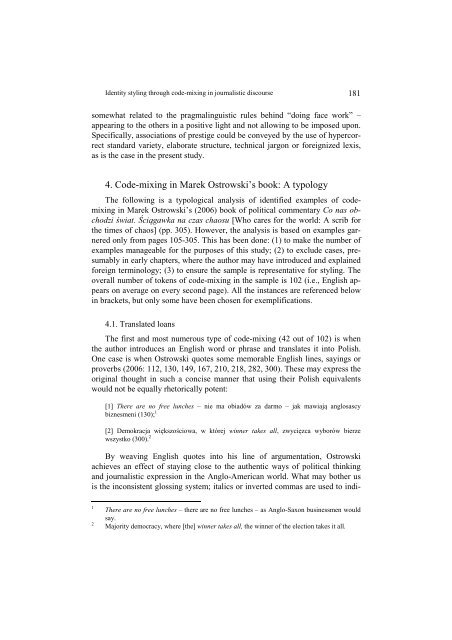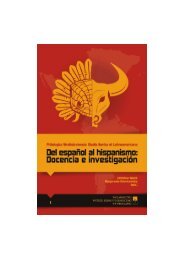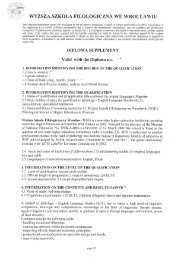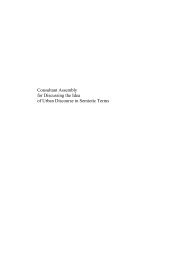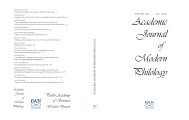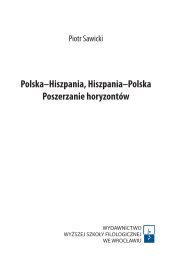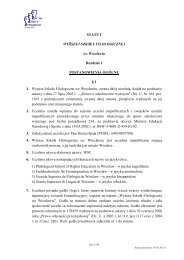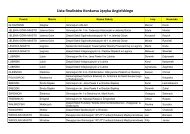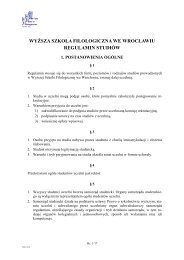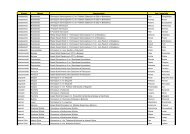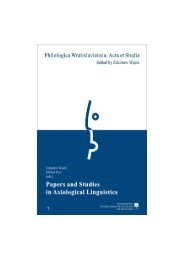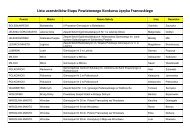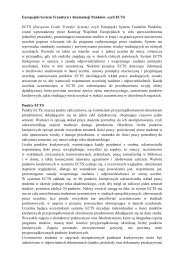s - Wyższa SzkoÅa Filologiczna we WrocÅawiu
s - Wyższa SzkoÅa Filologiczna we WrocÅawiu
s - Wyższa SzkoÅa Filologiczna we WrocÅawiu
You also want an ePaper? Increase the reach of your titles
YUMPU automatically turns print PDFs into web optimized ePapers that Google loves.
Identity styling through code-mixing in journalistic discourse 181<br />
somewhat related to the pragmalinguistic rules behind “doing face work” –<br />
appearing to the others in a positive light and not allowing to be imposed upon.<br />
Specifically, associations of prestige could be conveyed by the use of hypercorrect<br />
standard variety, elaborate structure, technical jargon or foreignized lexis,<br />
as is the case in the present study.<br />
4. Code-mixing in Marek Ostrowski’s book: A typology<br />
The following is a typological analysis of identified examples of codemixing<br />
in Marek Ostrowski’s (2006) book of political commentary Co nas obchodzi<br />
świat. Ściągawka na czas chaosu [Who cares for the world: A scrib for<br />
the times of chaos] (pp. 305). Ho<strong>we</strong>ver, the analysis is based on examples garnered<br />
only from pages 105-305. This has been done: (1) to make the number of<br />
examples manageable for the purposes of this study; (2) to exclude cases, presumably<br />
in early chapters, where the author may have introduced and explained<br />
foreign terminology; (3) to ensure the sample is representative for styling. The<br />
overall number of tokens of code-mixing in the sample is 102 (i.e., English appears<br />
on average on every second page). All the instances are referenced below<br />
in brackets, but only some have been chosen for exemplifications.<br />
4.1. Translated loans<br />
The first and most numerous type of code-mixing (42 out of 102) is when<br />
the author introduces an English word or phrase and translates it into Polish.<br />
One case is when Ostrowski quotes some memorable English lines, sayings or<br />
proverbs (2006: 112, 130, 149, 167, 210, 218, 282, 300). These may express the<br />
original thought in such a concise manner that using their Polish equivalents<br />
would not be equally rhetorically potent:<br />
[1] There are no free lunches – nie ma obiadów za darmo – jak mawiają anglosascy<br />
biznesmeni (130); 1<br />
[2] Demokracja większościowa, w której winner takes all, zwycięzca wyborów bierze<br />
wszystko (300). 2<br />
By <strong>we</strong>aving English quotes into his line of argumentation, Ostrowski<br />
achieves an effect of staying close to the authentic ways of political thinking<br />
and journalistic expression in the Anglo-American world. What may bother us<br />
is the inconsistent glossing system; italics or inverted commas are used to indi-<br />
1<br />
2<br />
There are no free lunches – there are no free lunches – as Anglo-Saxon businessmen would<br />
say.<br />
Majority democracy, where [the] winner takes all, the winner of the election takes it all.


